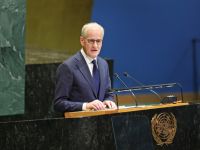Tourism professionals from 20 countries were told on Sunday that the new competitive edge in their industry is quality.
“In the battle for market share between the world's regions and destinations, quality, more perhaps than price level and product competitiveness, will be the main challenge facing the Middle East,” Francesco Frangialli, secretary general of the World Tourism Organisation, said while addressing around 150 participants to the Seminar on Integrated Quality Management in Tourism in the Middle East and North Africa.
Participants representing tourism, agriculture, foreign affairs, planning ministries, antiquities departments, tour operators and the World Tourism Organisation's Middle East representatives gathered to discuss environmental considerations in quality management, tourism policies, tourism sustainability, support programmes in the hotel industry and some countries' experiences in tourism quality management.
At the opening session of the seminar, Tourism Minister Aqel Biltaji pointed to the unprecedented growth rates in the provision of tourism services and facilities in the region. He said the growth was also matched by an increase in the number of arrivals and tourism receipts.
Tourist arrivals for the period 1995-1999 to the Middle East and North Africa increased annually by an average of 9.5 per cent, said Biltaji.
“[The] increase shows clearly that the conditions prevailing in the region have left an immediate positive impact. However, the share of Middle East tourism traffic from international tourism markets has been very modest as it did not exceed 2.7 per cent in the last decade,” said the minister.
“Therefore, there is potential to increase the share of the region as a percentage of global tourism,” he added.
To ensure the sustainability of tourism in Jordan in light of the flow of tourism services and facilities, Jordan has adopted a strategic quality management approach, according to Biltaji.
The ministry has introduced a quality management department. It has also created a steering committee to oversee the provision of adequate training and education in the field of tourism and hospitality services to ensure the availability of trained personnel in light of expansion on both the demand and supply sides.
“The tourism potential of the region could be further enhanced and developed through closer regional coordination and cooperation in areas such as planning, marketing, environment protection, investment and human resource development and issues related to quality management,” said Biltaji.
The World Tourism Organisation is an intergovernmental organisation that serves as a global forum for tourism policy and issues. Its members include 138 countries and territories as well as over 350 affiliate members from the pubic and private sectors. Its mission is to promote and develop tourism as a significant means of fostering international peace and understanding, economic development and international trade.
Its visiting representatives were in Amman as part of the first leg of a tour of Jordan, Palestine, Israel and Egypt. — ( Jordan Times )
© 2000 Mena Report (www.menareport.com)







